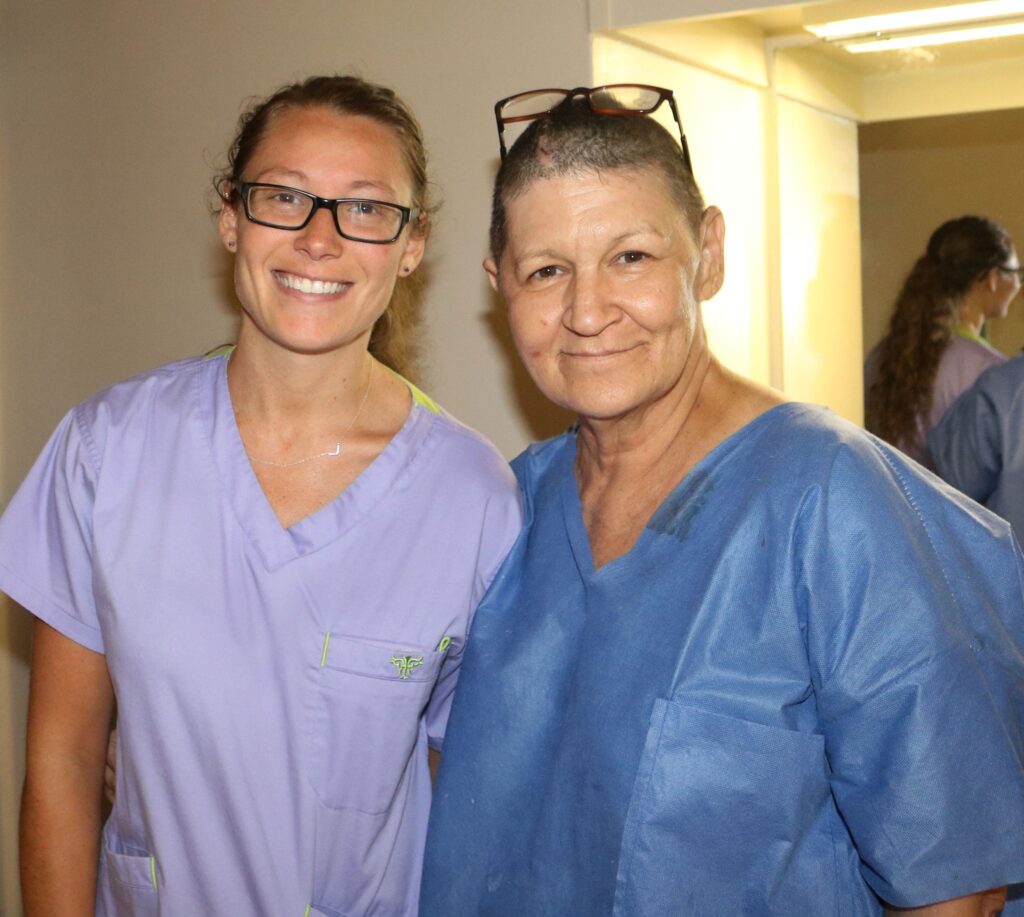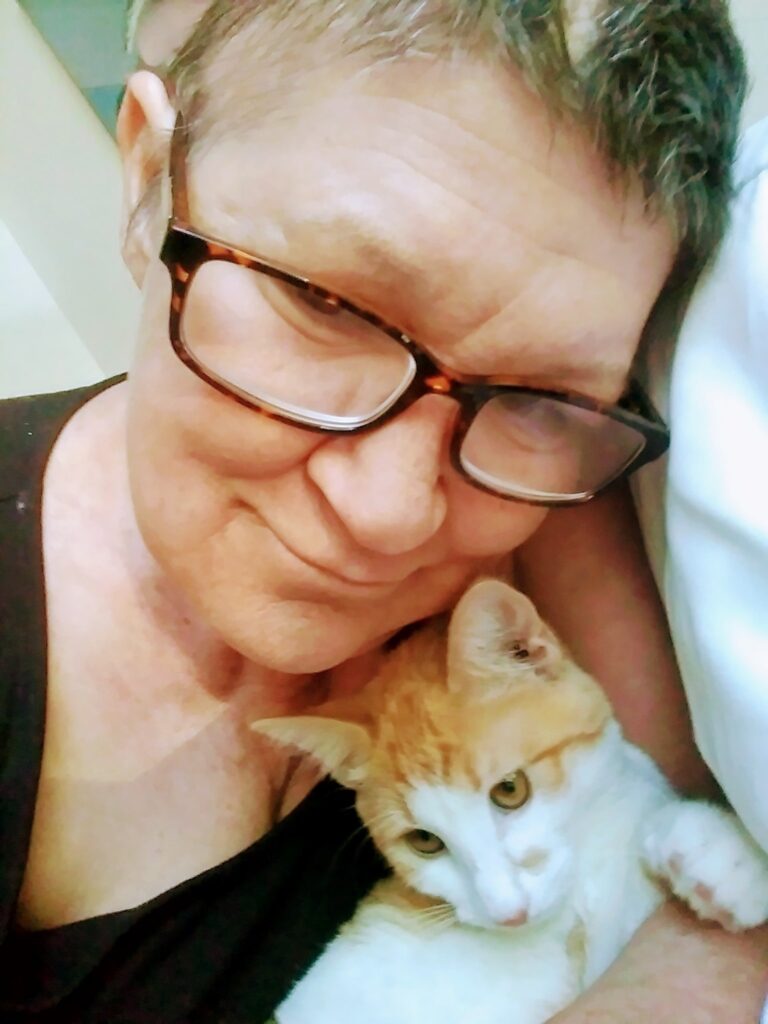Client Story – Joan Kite, TBI Survivor
Summary: Joan Kite, a two time Traumatic Brain Injury (TBI) survivor shared her story with DRT’s Lee Sherwood and discussed her recovery journey and what it means to be an advocate.
Last year, I had the pleasure of being introduced to Joan Kite. Joan is a survivor of not just one, but two, traumatic brain injuries and has been a dedicated participant of Disability Rights Tennessee’s (DRT’s) monthly Traumatic Brain Injury (TBI) support groups and art therapy classes. There are many important days and months throughout the year that celebrate the history, pride, and ongoing barriers for people with disabilities. While Joan’s story does not require a specific month or anniversary to share her amazing story, we do want to highlight that today, January 23, is the anniversary of the Protection & Advocacy for Individuals with Traumatic Brain Injury (PATBI) program (learn more about TBI services at DRT, click here). Joan emphasized the consistency of advocacy when we talked. She explained that when you have a disability yourself, it is not just those designated days or months that advocacy is front and center, it is every day. Through her involvement with DRT’s TBI support groups and general TBI program, Joan has found a supportive community that she emphasizes brought her out of feeling like she was “wandering in the wilderness alone.”
It is estimated that 1 in every 60 Americans, or roughly 5.3 million people in the United States live with a brain-injury related disability or traumatic brain injury (click here to read more). A traumatic brain injury is defined as “a disruption in the normal function of the brain that can be caused by a bump, blow, or jolt to the head, or penetrating head injury.” In 2020 alone, 21,399 Tennesseans had a TBI-related Emergency Department (ED) visit, hospitalization, or death. You can read more about the TBI registry, demographic information, and other TBI-related information in the 2022 TBI Annual Report linked here.
During the summer of 2019, Joan suffered her first TBI. While coming home one evening, Joan was attacked, and her skull was fractured. Joan mystified doctors as she “leapt” off the table following her craniotomy to relieve pressure and stop the bleeding in her skull. Following her full recovery from this injury, Joan did not associate herself with the TBI survivor label, admitting she didn’t fully understand what sustaining a TBI really meant for other survivors.
Joan is pictured here with a member of her medical team following her first craniotomy.

But it was just a mere 6 months later that Joan was crossing Gallatin Pike in East Nashville to visit her local Kroger that she was hit by a car and suffered her second TBI, this time a far more severe diagnosis. Joan was in a coma for 4 months during which, a lawyer was assigned to manage her estate based on her terminal diagnosis by doctors. Much to Joan’s dismay, once she defied her doctor’s diagnosis and woke up from her extended coma, all her belongings had been sold and she was not just awakening to adjust to her new disability but was homeless.
It wasn’t until March 2020 that Joan regained the level of consciousness necessary to begin rehabilitative care, including re-learning basic motor functions like eating and walking. Simultaneously, the COVID-19 pandemic was shutting down the world. But, in contrast to global uncertainty, Joan was able to stay employed in her position, putting together the Bulletin (an information newsletter), at Tennessee State University (TSU) due to suspended operations.
Upon Joan’s release from Vanderbilt University, a string of hardships followed. With all of her belongings being redistributed by her attorney when unconscious, Joan was forced to bounce between group homes for 6-8 months (which lacked the resources needed for someone recovering from a recent TBI). Following a 9-day stint in a homeless shelter, Joan finally moved into an apartment of her own on Christmas Eve in 2020 and adopted a cat to start this new chapter in her life. An apartment that she still calls home to this day.


Joan pictured above on the left following her second coma. Joan pictured above on the right with her new cat.
The 18-months the followed Joan’s second accident in late-2019 led her to the realization that existing mental health disorders can intensify (and even multiply) after a traumatic event. It was at this point that Joan was faced with the fact that she needed more stability, starting with a new job. In November 2022, Joan accepted and started a position at MeHarry Medical College where she serves as the Research Communications Editor within the Office for Research and Innovation, promoting medical research and developing a digital newsletter.
Joan identifies as having both a visible and invisible disability due to her two TBIs. “I might look okay on the outside, but like every TBI survivor, I have my own issues.” For many people with disabilities, colloquialisms, or throwaway phrases, used by able-bodied people trivialize some of the struggles associated with a disability. For Joan, her short-term memory was impacted by her second TBI, but sees it being trivialized in her day-to-day life when others try to sympathize with her condition by agreeing that they too “forget things all the time.” It is important for the community to understand that the impact of someone’s disability, visible or invisible, and any symptoms or behaviors are not an adjective or “quirk” through which to relate.
For Joan, advocacy means looking beyond immediate personal needs and instead being a part of systemic change to better the future for the benefit of your whole community.
Joan still grapples with unanswered questions about what her TBI diagnosis means for her future and any unknown impacts it may have as she ages. Yet, she is firm in her advocacy for fellow Tennesseans with a current TBI diagnosis and ensuring that anyone diagnosed in the future has more resources to rely on than she did. For Joan, advocacy means looking beyond immediate personal needs and instead being a part of systemic change to better the future for the benefit of your whole community.

Joan pictured above in present day at her new job.
DRT has resources for TBI survivors, family members, and community members, including bi-monthly support groups. You can review all of them in the “Resources” section of our website, linked here.
Author: Lee Sherwood, Director of Community Relations and Development
